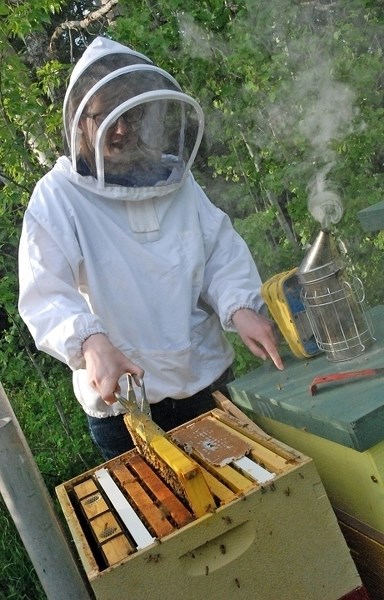At this time of year, as flowers bloom and bees embark on their quest to find pollen, some people might find themselves with uninvited guests buzzing about their property.
However, a local hobby beekeeper encourages residents to reconsider the urge to call an exterminator. Julia Vanderzwan, who lives with her husband Peter on a rural property north of Sundre in the James River area, discovered several years ago a passion for beekeeping after finding herself in a similar situation.
"We had a swarm of bees land in a tree in our yard," she told the Round Up, recalling the 2014 encounter during a recent phone interview.
"They made their home in a hole in the tree."
Although she tried ó with some help from her husband ó to capture the colony by catching the queen, their efforts did not initially yield success. However, the couple tried again the following year and was finally able to succeed. Half of the original hive had left with the old queen, but another colony remained with a new queen, she said.
Unfortunately, the learning curve remained an uphill experience and despite the swarm's successful capture, Vanderzwan said the bees did not survive their first winter.
However, with help and support from a professional beekeeper in Calgary who provides her with mentorship advice, she and Peter persisted in their efforts. They were able to establish in 2016 a few new colonies that made it through the winter, she said.
"I was so happy!"
While she had always had in the back of her mind an interest in beekeeping, the idea really did not get projected front and centre until a swarm actually landed in their yard, she said.
Today, the hobby bee enthusiast who works full time at the Sundre ATB has about a dozen colonies in boxed frame hives, and she has every intention to keep going.
"I find it very therapeutic," she said, acknowledging that not everyone might find a moment of Zen surrounded by buzzing bees.
"It's very relaxing, which might sound odd. I don't like insects, but I find something neat about bees. I'm definitely not a spider person, but I love my bees. They're very smart and very resourceful."
Additionally, she can't get enough of the smell of honey and beeswax.
Aside from having all of the necessary equipment such as the boxed hives, suits, and a specialized smoker that pacifies colonies, she said other challenges involved include ensuring the bees are healthy and unhampered by pests such as mites, as well as regularly keeping an eye out during the summer for the possibility of another queen cell, which is an indicator that a swarm is imminent.
"Once the new queen's born, the old queen leaves with half of the hive," which affects honey and beeswax production, she said. The idea is to catch any new queen cells before that happens and either pinch or split them.
"I usually split them," she said, in reference to preserving the queen cell rather than destroying it in case the need for another queen should come up.
Swarms can be active all summer, although people have called her as early in the season as the end of May. Also, the earlier a swarm can be captured, the better its chances are of surviving the winter since it has more time to prepare the hive.
She also encourages people who are neighbours of beekeepers to be mindful of spraying pesticides as well as herbicides, and recommends considering natural options such as vinegar to deal with weeds.
"If you know your neighbours have bees, let them know ahead of time (if you plan to spray)," she said, explaining that restricting bees to their hives is possible for such situations.
And despite the common concern of getting stung, she said bees are generally not dangerous ó even when they swarm ó unless they're feeling threatened.
"Then, of course they're going to protect themselves."
So instead of calling an exterminator, Vanderzwan asks anyone with bee guests to call her at 403-638-1891, or any other beekeepers in the area. Alternatively, she can be contacted through her Facebook page called WildBee Honey AB.
"Don't spray them and don't call the exterminator!"
Of course that being said, she won't hold a grudge against anyone who decides to call an exterminator for a wasp infestation.



